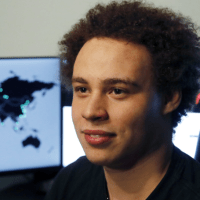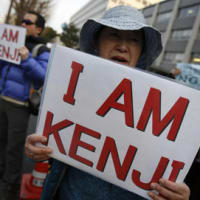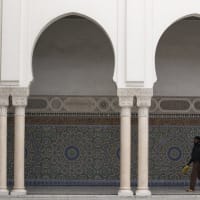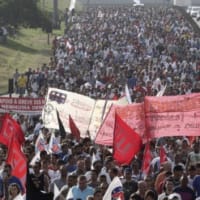U.S. Underwhelmed With Emerging Powers At U.N.
国連における新興国の動きに米国落胆
弱小国は弱小国としての戦略をとる、米国の後ろ盾の約束もときには効き目がない。米国の威光が弱まりロシア、中国の軸が影響力を増す。新興国は結束して独自の主張をし始める。
by Michele Kelemen
September 17, 2011

David Karp/AP
India, Brazil and South Africa have temporary seats on the U.N. Security Council, but the U.S. and human rights activists have not been impressed with the performance of these rising nations. インド、ブラジル、南アフリカは国連安保理事会で仮議席を持っているが、米国と人権活動家は、これら新興国家の振る舞いに満足していない。

David Karp/AP
Susan Rice, U.S. ambassador to the United Nations, says the positions taken by the emerging powers haven't been encouraging.
米国国連大使スーザン・ライスは新興国が得た地位は、助けになっていないと言っている。
September 17, 2011
It's the time of year when world leaders converge at the United Nations headquarters in New York. And this year, there will be a lot of talk about multilateral diplomacy — a priority for the Obama administration since it came to office.
今が一年で、世界中の指導者が国連本部に集まる時期である。 そして今年は多国間外交について多くの事が語られるであろう。それはオバマ政権になって以来の優先事項でもある。
Obama's team has courted the world's rising powers, even publicly backing India's hopes to one day be a permanent member of the U.N. Security Council. But now that India, along with South Africa and Brazil, have rotating seats on the council, U.S. officials and many human rights activists complain they're not living up to expectations.
オバマチームは世界の新興勢力の国々を取り込もうとしてきた、中には国連安保理事会の常任理事国入りを望むインドを公けにバックアップする意向を示しりした。しかし、インドは南アフリカやブラジルと歩調を合わせて、理事会の出席を持ち回りにしている。 米国関係者や多くの人権活動家は、彼らが期待に応えていないと不平を漏らしている。
Susan Rice, the U.S. ambassador to the U.N., says she's had a chance to get a close-up look at how those three countries have been acting on the world stage lately. She's not sounding particularly enthusiastic.
米国国連大使スーザン・ライスは、最近この世界の舞台でこれらの3か国がどのように活動しているか詳しく見る機会があったと述べた。 その彼女の発言は特段熱を帯びたものではなかった。
"This has been an opportunity for them to demonstrate how they might act if they were to obtain permanent membership, and for us to assess our level of enthusiasm about that," she says. "Let me just say we've learned a lot, and not all of it, frankly, encouraging."
「もし、彼らが常任理事の資格を得ようとするのなら、彼らにとってこれは、彼らがどのように活動するか訴える良い機会だった、そして我々にとっては、それについて私たちの熱意の程度を計る良い機会でもあった。」と彼女は言う。「そうね、大いに勉強になったわ、全てではないけど、率直に言って、期待している。」
'Extremely Disappointing' 非常に落胆している
Philippe Bolopion, who monitors the U.N. for Human Rights Watch, has also been keeping tabs on these countries and doesn't like what he sees, either — especially in the case of Syria.
人権監視のために国連をモニターしているフィリップ・ボロピオンも、これらの国々の振る舞いを追跡調査しているが、彼もそれらの行動を嫌っている。 とくにシリアのケースについて。
"It is extremely disappointing, to say the least, to see that India, Brazil and South Africa, for example, are not more eager to get more Security Council action on Syria," he says. "Over 2,000 protesters, peaceful protesters, have been killed — and yet these countries are reluctant to apply any significant pressure on the Assad regime."
「これには大変がっかりさせられた。少なくともそう言える。 例えばインド、ブラジルそして南アフリカは、シリアについての安保理事会がもっと行動するように、熱心に動かなかった。 2000人を超える抗議の民衆、平和的な抗議運動の人々が殺されているのに、これらの国々は、いまだにアサド政権に対しての、いかなる明確な圧力をかける動きに対しても後ろ向きなのです。」と彼は言う。
U.N. ambassadors from those three nations went to Syria to meet with officials in President Bashar Assad's government. While Bolopion says it made sense for them to try diplomacy, that effort has clearly failed. Still, he says, they don't seem eager to step up the pressure on Assad even now.
これら3か国の国連大使はシリアに出向きアサド大統領の政府要人と会談を持っている。ボロピオンは彼らが外交力を発揮しようとするのは意味のあることだとしながらも、それらの努力は明らかに失敗に終わっている。 それなのに、いまだに、彼らは今でもアサドへの圧力をかけることに後ろ向きである。
The same is true in the case of Sudan, he says, despite U.N. reports that the Sudanese air force has been bombing civilians in a region called Southern Kordofan.
スーダンについても同じことが言える、国連の報告がスーダンの空軍が南コードファンと呼ばれる地域で民間人を爆撃しているとうにも関わらずであると彼は言う。
"The U.N. has documented crimes against humanity, in some cases. U.N. peacekeepers have been subjected to mock executions. A U.N. contractor was even killed," Bolopion says. "And yet the Security Council did not say a single word, not even a statement, absolutely nothing. And of course, the Sudanese regime takes notice of that stuff."
「国連は、あるケースについては、人道に対する犯罪だとする書類を出している。国連平和維持隊員が模擬処刑の対象にされ、国連の契約業者が殺害されてもいる。」とボロピオンは言う。「しかるに、国連安保理事会は一言の言葉も、声明も出していないのである、全く何もしていない。そして、当然のことながらスーダン政府は、このことを承知している。」
That's a case where you might expect a big regional player like South Africa would want to take a lead, he says.
"Their inaction on key human rights issues is quite puzzling, because they do at home defend the very values we would hope to see them defend in the Security Council," Bolopion says.
これらは、南アフリカのような、その地域の主役(プレーヤー)が主導的な役割を担うケースだと彼は言う。
「大事な人権問題に対する彼らの不活動は誠に理解しがたい、なぜなら、それらの国々が国内で、まさにその価値を護っているのであるから、安保会議でもそのように振る舞うのを我々は期待したい。」とボロピオンは語る。
Competing Interests 国益の競合
But there are a lot of big power politics at play at the United Nations, according to David Bosco, author of the book, Five to Rule Them All, a history of the Security Council. He says Brazil, India and South Africa have their own historical allies and see themselves as representing the developing world.
しかし、安保理事会の歴史を描いた「全てを支配する5つ」の著者であるディビッド・ボスコによると、国連の舞台には多くの政治力学(パワーポリティクス)が働いているという。 彼は、ブラジル、インド、そして南アフリカには、彼等自身の歴史的な同盟関係の国々があり、彼ら自身を開発途上国世界の代表だとみている節があると言う。
"There is, kind of coded into the DNA of these emerging powers, a deep skepticism of the West, in particular Western interventionism," Bosco says. "The Libya operation actually intensified that uncertainty and suspicion of Western intervention, because they saw the Libya intervention as regime change in the guise of humanitarian intervention."
「それは、これら新興国のDNAに刻み込まれた暗号のようなもので、西側に対する根深い懐疑、特に西側の干渉主義に対するそれである。」とボスコは言う。「リビアにおける作戦は、実際に西側各国干渉の不確かさと疑念を深めた、なぜなら彼らはリビアへの干渉は、人道的干渉という仮面をかぶった体制転換とみているからだ。」
Bosco, an assistant professor at the American University School of International Service, says there's another reason why these countries don't often align themselves with Washington. If the Security Council ever does expand, they'd need broad support.
アメリカン大学のスクールオブインターナショナルサービスの准教授である、ボスコは、これらの国々がワシントンにしばしば歩調を合わせない他の理由があるという。それは安全保障理事会が拡大されたとき、彼らはより多くの支持を得たいと思っているからだ。
"They have to think about not only how do we cultivate Washington, but how do we cultivate all the other small and midsized states around the world that are going to determine what the shape of the new Security Council will be," he says. "Russia and China, of course, are big players here, and they are an alternative pole of many of these issues on human rights and interventionism."
Eventually, Bosco believes, this dry run of sorts will sour the U.S. on the idea of Security Council expansion.
「彼らはいかにしてワシントンとの関係を深めるかを考えるだけでなく、新しい安保理事会の姿を決定するであろう、世界中の他の中小国家群との関係を深めることを考えている。」と彼は言う。「ロシアと中国も、もちろん、ここでは主要なプレーヤーである。そして彼らは人権と干渉主義のこれらの多くの問題の別の主軸を形成している。
事実、この種のリハーサルは、安保理事会の拡大案について、米国にとって幻滅を感じる出来事となるだろう。
国連における新興国の動きに米国落胆
弱小国は弱小国としての戦略をとる、米国の後ろ盾の約束もときには効き目がない。米国の威光が弱まりロシア、中国の軸が影響力を増す。新興国は結束して独自の主張をし始める。
by Michele Kelemen
September 17, 2011

David Karp/AP
India, Brazil and South Africa have temporary seats on the U.N. Security Council, but the U.S. and human rights activists have not been impressed with the performance of these rising nations. インド、ブラジル、南アフリカは国連安保理事会で仮議席を持っているが、米国と人権活動家は、これら新興国家の振る舞いに満足していない。

David Karp/AP
Susan Rice, U.S. ambassador to the United Nations, says the positions taken by the emerging powers haven't been encouraging.
米国国連大使スーザン・ライスは新興国が得た地位は、助けになっていないと言っている。
September 17, 2011
It's the time of year when world leaders converge at the United Nations headquarters in New York. And this year, there will be a lot of talk about multilateral diplomacy — a priority for the Obama administration since it came to office.
今が一年で、世界中の指導者が国連本部に集まる時期である。 そして今年は多国間外交について多くの事が語られるであろう。それはオバマ政権になって以来の優先事項でもある。
Obama's team has courted the world's rising powers, even publicly backing India's hopes to one day be a permanent member of the U.N. Security Council. But now that India, along with South Africa and Brazil, have rotating seats on the council, U.S. officials and many human rights activists complain they're not living up to expectations.
オバマチームは世界の新興勢力の国々を取り込もうとしてきた、中には国連安保理事会の常任理事国入りを望むインドを公けにバックアップする意向を示しりした。しかし、インドは南アフリカやブラジルと歩調を合わせて、理事会の出席を持ち回りにしている。 米国関係者や多くの人権活動家は、彼らが期待に応えていないと不平を漏らしている。
Susan Rice, the U.S. ambassador to the U.N., says she's had a chance to get a close-up look at how those three countries have been acting on the world stage lately. She's not sounding particularly enthusiastic.
米国国連大使スーザン・ライスは、最近この世界の舞台でこれらの3か国がどのように活動しているか詳しく見る機会があったと述べた。 その彼女の発言は特段熱を帯びたものではなかった。
"This has been an opportunity for them to demonstrate how they might act if they were to obtain permanent membership, and for us to assess our level of enthusiasm about that," she says. "Let me just say we've learned a lot, and not all of it, frankly, encouraging."
「もし、彼らが常任理事の資格を得ようとするのなら、彼らにとってこれは、彼らがどのように活動するか訴える良い機会だった、そして我々にとっては、それについて私たちの熱意の程度を計る良い機会でもあった。」と彼女は言う。「そうね、大いに勉強になったわ、全てではないけど、率直に言って、期待している。」
'Extremely Disappointing' 非常に落胆している
Philippe Bolopion, who monitors the U.N. for Human Rights Watch, has also been keeping tabs on these countries and doesn't like what he sees, either — especially in the case of Syria.
人権監視のために国連をモニターしているフィリップ・ボロピオンも、これらの国々の振る舞いを追跡調査しているが、彼もそれらの行動を嫌っている。 とくにシリアのケースについて。
"It is extremely disappointing, to say the least, to see that India, Brazil and South Africa, for example, are not more eager to get more Security Council action on Syria," he says. "Over 2,000 protesters, peaceful protesters, have been killed — and yet these countries are reluctant to apply any significant pressure on the Assad regime."
「これには大変がっかりさせられた。少なくともそう言える。 例えばインド、ブラジルそして南アフリカは、シリアについての安保理事会がもっと行動するように、熱心に動かなかった。 2000人を超える抗議の民衆、平和的な抗議運動の人々が殺されているのに、これらの国々は、いまだにアサド政権に対しての、いかなる明確な圧力をかける動きに対しても後ろ向きなのです。」と彼は言う。
U.N. ambassadors from those three nations went to Syria to meet with officials in President Bashar Assad's government. While Bolopion says it made sense for them to try diplomacy, that effort has clearly failed. Still, he says, they don't seem eager to step up the pressure on Assad even now.
これら3か国の国連大使はシリアに出向きアサド大統領の政府要人と会談を持っている。ボロピオンは彼らが外交力を発揮しようとするのは意味のあることだとしながらも、それらの努力は明らかに失敗に終わっている。 それなのに、いまだに、彼らは今でもアサドへの圧力をかけることに後ろ向きである。
The same is true in the case of Sudan, he says, despite U.N. reports that the Sudanese air force has been bombing civilians in a region called Southern Kordofan.
スーダンについても同じことが言える、国連の報告がスーダンの空軍が南コードファンと呼ばれる地域で民間人を爆撃しているとうにも関わらずであると彼は言う。
"The U.N. has documented crimes against humanity, in some cases. U.N. peacekeepers have been subjected to mock executions. A U.N. contractor was even killed," Bolopion says. "And yet the Security Council did not say a single word, not even a statement, absolutely nothing. And of course, the Sudanese regime takes notice of that stuff."
「国連は、あるケースについては、人道に対する犯罪だとする書類を出している。国連平和維持隊員が模擬処刑の対象にされ、国連の契約業者が殺害されてもいる。」とボロピオンは言う。「しかるに、国連安保理事会は一言の言葉も、声明も出していないのである、全く何もしていない。そして、当然のことながらスーダン政府は、このことを承知している。」
That's a case where you might expect a big regional player like South Africa would want to take a lead, he says.
"Their inaction on key human rights issues is quite puzzling, because they do at home defend the very values we would hope to see them defend in the Security Council," Bolopion says.
これらは、南アフリカのような、その地域の主役(プレーヤー)が主導的な役割を担うケースだと彼は言う。
「大事な人権問題に対する彼らの不活動は誠に理解しがたい、なぜなら、それらの国々が国内で、まさにその価値を護っているのであるから、安保会議でもそのように振る舞うのを我々は期待したい。」とボロピオンは語る。
Competing Interests 国益の競合
But there are a lot of big power politics at play at the United Nations, according to David Bosco, author of the book, Five to Rule Them All, a history of the Security Council. He says Brazil, India and South Africa have their own historical allies and see themselves as representing the developing world.
しかし、安保理事会の歴史を描いた「全てを支配する5つ」の著者であるディビッド・ボスコによると、国連の舞台には多くの政治力学(パワーポリティクス)が働いているという。 彼は、ブラジル、インド、そして南アフリカには、彼等自身の歴史的な同盟関係の国々があり、彼ら自身を開発途上国世界の代表だとみている節があると言う。
"There is, kind of coded into the DNA of these emerging powers, a deep skepticism of the West, in particular Western interventionism," Bosco says. "The Libya operation actually intensified that uncertainty and suspicion of Western intervention, because they saw the Libya intervention as regime change in the guise of humanitarian intervention."
「それは、これら新興国のDNAに刻み込まれた暗号のようなもので、西側に対する根深い懐疑、特に西側の干渉主義に対するそれである。」とボスコは言う。「リビアにおける作戦は、実際に西側各国干渉の不確かさと疑念を深めた、なぜなら彼らはリビアへの干渉は、人道的干渉という仮面をかぶった体制転換とみているからだ。」
Bosco, an assistant professor at the American University School of International Service, says there's another reason why these countries don't often align themselves with Washington. If the Security Council ever does expand, they'd need broad support.
アメリカン大学のスクールオブインターナショナルサービスの准教授である、ボスコは、これらの国々がワシントンにしばしば歩調を合わせない他の理由があるという。それは安全保障理事会が拡大されたとき、彼らはより多くの支持を得たいと思っているからだ。
"They have to think about not only how do we cultivate Washington, but how do we cultivate all the other small and midsized states around the world that are going to determine what the shape of the new Security Council will be," he says. "Russia and China, of course, are big players here, and they are an alternative pole of many of these issues on human rights and interventionism."
Eventually, Bosco believes, this dry run of sorts will sour the U.S. on the idea of Security Council expansion.
「彼らはいかにしてワシントンとの関係を深めるかを考えるだけでなく、新しい安保理事会の姿を決定するであろう、世界中の他の中小国家群との関係を深めることを考えている。」と彼は言う。「ロシアと中国も、もちろん、ここでは主要なプレーヤーである。そして彼らは人権と干渉主義のこれらの多くの問題の別の主軸を形成している。
事実、この種のリハーサルは、安保理事会の拡大案について、米国にとって幻滅を感じる出来事となるだろう。




















※コメント投稿者のブログIDはブログ作成者のみに通知されます